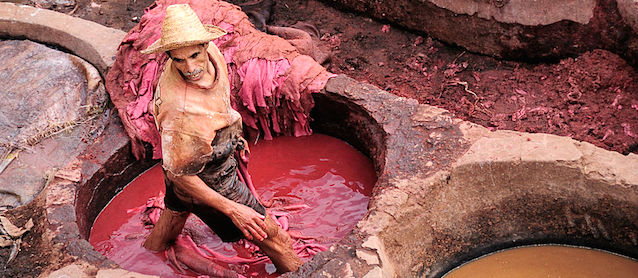Quality leather is soft to the touch, rich in color and an all-around joy to work with. But how much do you really know about the industry that produces it?
Tech blog Gizmodo recently published an exposé titled “How Leather is Slowly Killing the People and Places that Make It.” The article sheds light on the darker side of tanneries, especially those in developing countries that produce bargain-priced varieties, and hints at what we, as a community, can do about it.
Below is a short excerpt from the article:
The tanning industry poses many dangers to both the environment and those that work within it. The primary environmental threat involves the dumping of solid and liquid waste that contains leftover chromium and other hazardous compounds. This is commonplace in regions without strong environmental protection standards, which also happen to be the primary regions where leather is tanned, such as China, India, and Bangladesh.
Even in fully modernized and carefully managed facilities, it is nearly impossible to reclaim all of the pollutants generated by the tanning process. As a rule of thumb, tanning one ton of hide typically results in 20 to 80 cubic meters of wastewater with Chromium concentrations around 250 mg/L and sulfide concentrations at roughly 500 mg/L, not to mention the offal effluence from the preparation phase and the pesticides often added to keep mold growth down during transport to the facility. Hell, 70 percent of an untreated hide is eventually discarded as solid waste—the hair, fat, meat, sinew, all goes straight into the trash. […]
Work within the tannery itself is fraught with dangers—often the result of inadequate or non-existent worker protections. These includes slips and falls on improperly drained floors; exposure to lime, tanning liquor, acids, bases, solvents, disinfectants, and other noxious chemicals; injury from heavy machinery or flaying knives; drowning, being boiled alive, or buried in lime, are all terrifyingly real hazards.
Still, the most dangerous part of modern tanning is handling chromium. In humans, chromium causes a myriad of ailments depending on how it is absorbed.
When inhaled, chromium acts as a lung irritant and carcinogen, affecting the upper respiratory tract, obstructing airways, and increasing the chances of developing lung, nasal, or sinus cancer. Chromium normally is absorbed this way as fine particulate dust that is produced when both raw and tanned leathers are buffed, smoothed, and ground up. Chromium has been linked to increased rates of asthma, bronchitis, polyps of the upper respiratory tract, pharyngitis, and the enlargement of the hilar region and lymph nodes.
Additionally, the raw hides are also a breeding ground for anthrax, which can easily make the leap to humans by mixing with aerosolized pollution, though this has been virtually eliminated in the Western tanning industry now that hides are disinfected before being shipped for processing.
It doesn’t play well with your skin either. Once absorbed through unprotected handling, chromium can cause dry, cracked, and scaled skin; as well as erosive ulcerations that refuse to heal known “chrome holes.”
As sad as this reality is, I’m not drawing The Hog Ring community’s attention to this issue to dissuade anyone from purchasing or upholstering car interiors in leather. There are a lot of solid tanneries that produce hides safely and ethically, and even more suppliers that distribute them.
However, I do believe that it’s important to know where the products we use come from. That way, we can operate our businesses with social responsibility.
Of course, one auto upholstery shop can’t stop tanneries in developing countries from endangering workers and the environment. However, an entire industry boycotting hides from those with low safety standards can. Think about it…

From a paper I wrote last year on the environmental impact of vinyl and polyurethane:
“…this citation is a study about one tannery district in one country – and while it is not indicative of all tanneries, it has become potentially more common as tanning operations have migrated to developing nations. Tanning uses an abundance of chemicals, such as “sodium sulphite and basic chromium sulphate including non-ionic wetting agents, bactericides, soda ash, CaO, ammonium sulphide, ammonium chloride and enzymes, sodium bisulphate, sodium chlorite, NaCl, H2SO4, formic acid, sodium formate, sodium bicarbonate, vegetable tannins, syntans, resins, polyurethane, dyes, fat emulsions, pigments, binders, waxes, lacquers and formaldehyde” (Azom, M., Mahmud, K., Yahya, S., Sontu, A., & Himon, S., 2012). Of these, 80% is waste, as the hide only absorbs 20% of the chemicals. The rest is, along with chromium, dumped untreated into the water, upwards of 95,000 liters daily, or sold to lower-level tanning operations (lower level in this case produce a cheaper grade of leather) to be reused – which increases the danger to these workers, who are often less protected than the initial tannery workers (which may not be protected themselves) (Azom, M., Mahmud, K., Yahya, S., Sontu, A., & Himon, S., 2012). While this is, again, one location, this is an example of the toxicity of leather production, and provides a comparison to both vinyl and polyurethane regarding their relative toxic content.”